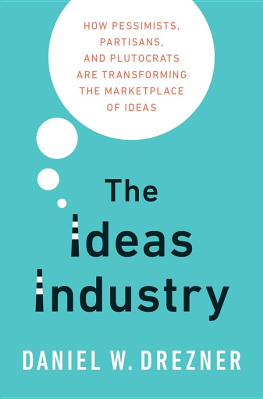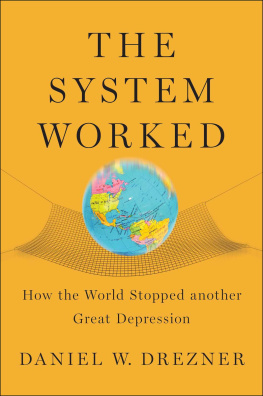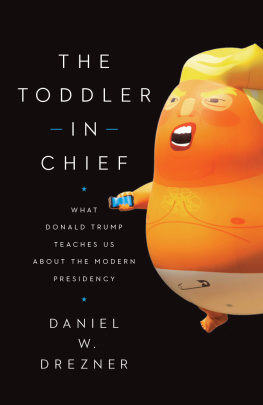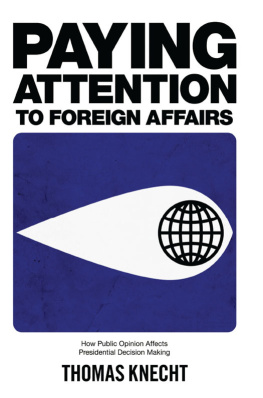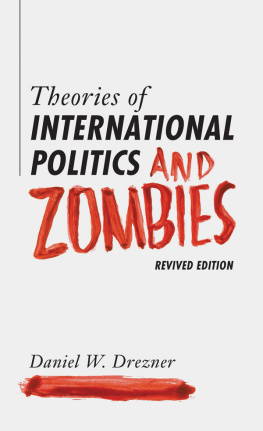THE IDEAS INDUSTRY


Oxford University Press is a department of the University of Oxford. It furthers the Universitys objective of excellence in research, scholarship, and education by publishing worldwide. Oxford is a registered trade mark of Oxford University Press in the UK and certain other countries.
Published in the United States of America by Oxford University Press
198 Madison Avenue, New York, NY 10016, United States of America.
Oxford University Press 2017
All rights reserved. No part of this publication may be reproduced, stored in a retrieval system, or transmitted, in any form or by any means, without the prior permission in writing of Oxford University Press, or as expressly permitted by law, by license, or under terms agreed with the appropriate reproduction rights organization. Inquiries concerning reproduction outside the scope of the above should be sent to the Rights Department, Oxford University Press, at the address above.
You must not circulate this work in any other form and you must impose this same condition on any acquirer.
CIP data is on file at the Library of Congress
ISBN 9780190264604
eISBN 9780190264628
This book is dedicated to the teachers at Avon High School and Williams College who nudged me into something resembling a writer:
Evelyn Blitzer, Robert Buckley, Roger Dennis, Renata Kadden, Ken Lukasiewicz, Janet Schwartz, Alicia Willet, Sam Crane, Robert Whitesell, and especially Jim Shepard.
The idea is not a substitute for work; and work, in turn, cannot substitute for or compel an idea, just as little as enthusiasm can. Both, enthusiasm and work, and above all both of them jointly, can entice the idea.
Max Weber, Science as a Vocation
CONTENTS


This was a fast, nerve-wracking book to write. It was fast because soon after starting I realized that I had been mulling over The Ideas Industrys core themes for well over a decade. The arguments, evidence, and anecdotes contained in these pages emerged from over two decades of experience navigating the modern marketplace of ideas. It was nerve-wracking because, halfway through The Ideas Industrys first draft, I recognized that this was only nominally a book about international relations. Although the subject of this book has been the marketplace of foreign policy ideas, the arguments made herein are really about changes in American politics. Like a traditional public intellectual, I am making arguments a bit afield from my principal area of expertise.
This new terrain leaves me even more grateful than usual to the many people who have assisted me during the writing of this book. I first must thank David McBride and Niko Pfund at Oxford University Press for their early encouragement and enthusiastic support when I had merely a vague proposal. I am also grateful to Kathleen Weaver, Cat Boyd, Rob Wilkinson, Mary Harper, and the copy editor Heather Hambleton for shepherding this book from computer files to print.
I have been the beneficiary of considerable institutional support while writing this book. At the Fletcher School, Dean James Stavridis and Academic Dean Steven Block have created a vibrant space for me to think about intellectual affairs. I am also grateful to my Fletcher colleagues Zeynep Bulutgil, Nancy Hite-Rubin, Kelly Sims Gallagher, Sulmaan Khan, Michael Klein, Eileen Babbitt, Ian Johnstone, Bhaskar Chakravorti, and Jette Knudsen for their feedback and insights. Rachel Brown, Sheri Callender, Paulette Folkins, Meg Guliford, Aaron Melaas, Estefania Marchan, Emily Morgenstern, Melanie Reed, and Mohannad Al-Suwaidan all provided invaluable administrative and research support. As a nonresident senior fellow at the Brookings Institution, I profited greatly from the feedback of Bruce Jones, Tom Wright, and Tamara Cofman Wittes. At the Chicago Council on Global Affairs, Dina Smeltz held my hand through some of the public opinion discussions.
Foundation support, a key driver behind the Ideas Industry, was also a key driver behind the writing of The Ideas Industry. The Michael and Andrea Leven Foundation provided crucial financial support during the research and drafting of this book. The Carnegie Corporations Rigor and Relevance Initiative provided a grant to the Fletcher School and helped inform my thinking as I was revising the manuscript. The Rockefeller Foundation provided me a residency at their Bellagio Center to put the finishing touches on the book.
Between 2014 and 2016 I organized a series of four Ideas Industry conferences at Fletcher on various dimensions of the marketplace of ideas. The conferences themselves, as well as the informal conversations surrounding the panels, were invaluable to me as I was getting a grip on what made the modern Ideas Industry tick. I am grateful to everyone who participated and assisted in those conferences. I also inflicted an embryonic version of the book manuscript on my Spring 2016 Politics of Statecraft students. I am grateful for their feedback, particularly the trenchant points made by Denise Baltuskonis, Jon Cheatwood, Kate Jordan, Ian Kapuza, Matt Keller, Kerney Perlik, Seth Turner, and Mike Wackenreuter.
Many of the ideas, notions, and actual paragraphs in the text had their origins in blog posts and essays for other outlets. I thank Benjamin Pauker at Foreign Policy, Susan Glasser and Blake Hounshell at Politico, Evan Goldstein at the Chronicle of Higher Education, and Mike Madden and Adam B. Kushner at the Washington Post for their editorial guidance. They all made me look like a better writer than I actually am. A nascent and condensed version of Chapter 5 appeared in the December 2015 issue of International Journal. I am grateful to the editors of that journal for releasing their copyright.
I talked, in formal and not-so-formal interviews, with a variety of participants in the Ideas Industry to get a better grasp on my subject matter. I am indebted to Gideon Rose, Fareed Zakaria, Niall Ferguson, and Joseph Nye in particular for setting aside time to answer my many queries. I appreciate the correspondence and conversations I had with Franklin Foer, Nicholas Kristof, Jeffrey Sachs, and Nassim Taleb. The 209 respondents to my elite survey also made this project much, much easier, and I thank those very busy people for taking the time to answer my questionnaire.
I am far from the only person interested in this subject. In the process of writing this book I received extraordinarily useful feedback from a variety of close readers. Bethany Albertson, Deborah Avant, Nada Bakos, Bear Braumoeller, Josh Busby, Kristin Butcher, Stephanie Carvin, Charli Carpenter, Brad DeLong, Steve Del Rosso, Michael Desch, Rob Farley, Henry Farrell, Justin Fox, Suzanne Fry, David Gordon, Heather Hurlburt, Leslie Johns, Sulmaan Khan, Ron Krebs, Michael Horowitz, Michael Levi, Jacob Levy, Jonathan Kirshner, Kate McNamara, Jeffrey Isaac, Jonathan Monten, Daniel Nexon, Milena Rodban, Mary Sarotte, Elizabeth Saunders, Laura Seay, Randy Schweller, Erin Simpson, Dina Smeltz, Mike Tierney, Jill Ultan, Lynn Vavreck, and Diana Wueger provided comments that made this book much better. Any remaining faults are strictly my own.

